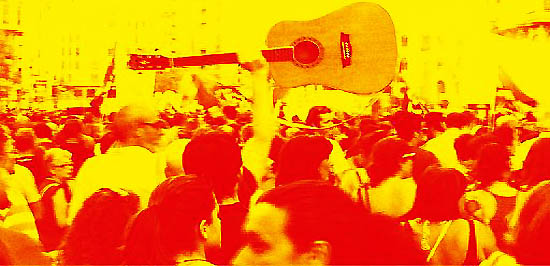|
The Valencian Country of Spain includes the three provinces of Castellon, Valencia and Alicante (Alacant) echoing a medieval kingdom that was created when Catalan nobles and an Aragonese king displaced a part of the Arabic civilization of Spain in the 13th Century. In 1707 the battle of Almansa established Castillian rule. After a long decline, the Catalan language had given much ground to Castilian but it held on, particularly in the areas between the cities of Valencia and Alicante.
During the dictatorship (1939-77) a dirty war was fought to erase both the left-wing working class and the Catalan-speaking population or at least their identity.
After Franco's dictatorship ended, some music emerged from this region with artists such as Raimon and Alcoi's Ovidi Montllor becoming popular especially in Barcelona with its large Catalan speaking market. His song Perque Vull, covered by many artists today, exemplified the yearning for freedom in the post-Franco era. But political forces made it difficult for Catalan-language Valencian artists to prosper at home. A generation was told, in the face of all linguistic evidence, that their Valencian language was something other than Catalan. It was difficult to find public venues. Groups like Al Tall in the 1980s and 90s began exploring Valencian music, history and folklore. Songs like Lladres "thieves that entered from Almansa..." helped recover another perspective on the history of the region, differing from the official state history. Miquel Gil was a solo artist who emerged from this group. As sociologist Rafa Xambó wrote (Sao, May 2014 "The renaissance of Valencian language music") "It is notable that, in spite of the many setbacks and rebuffs by the political elites, the cultural loyalty of the young generations an the momentum built by a galaxy of artists brouhht about an excellent result."
In the 90s, heavily influenced by Basque groups such as Negu Gorriak, Jamaican music and traditional music, the legendary Valencian group Obrint Pas from the university campuses in the suburbs of Valencia, developed a unique local style. Clad in matching black shirts and with a dulcaina as lead instrument, Obrint Pas blended rock, ska and Valencian tradional music. Led by Xavi Sarria and Miquel Girones, the group gradual built a following in the Catalan-speaking areas (primarily Valencia, Balearic Islands, Catalonia proper, Roussillon) and finally gained fame with La Flama, from the eponymous album, around 2004. They followed this with the landmark discs 'Benvingut al Paradis' 2007 (looking at third-world immigration to Europe) and 'Coratge' 2011. As Vicent Xavier Contri wrote "Obrint Pas changed the history of music in the Catalan Countries."
Inspired by this example, from the little town of Pego, Josep Nadal's group La Gossa Sorda, contained many of the same elements, with poignant lyrics including commentaries on contemporary events. Their song 'Cavallers' was a cry of 'shame' at the 'gentlemen' of the Popular Party who seemed to treat the Valencian government as a private trough. With their last studio album, La Polseguera (2013.?)) they explored more interesting musical territory including the title track featuring Carles Denia.
Groups such as these freely explored the traumatic events of history, including the civil war of 36-39, and events of the post-war and transition periods. Other classic groups included rockers Brams, and alternative favorites Pinka, Sant Gatxo, to name three. Here is Sant Gatxo touring on its 20th anniversary:
Another more musically innovative group that attracted a following (despite not releasing discs in the traditional format) was Orxata Sound System, with its funky blend of Latin-influenced electronica strongly rooted in the contemporary Valencian world (orxata is a reference to the locally typical drink of tiger-nut milk). 'Ho podem tot' is somewhat representative of this iconic group.
These popular groups also worked closely in this renaissance with the folk revival. In this context one artist in particular, Pep Gimeno "Botifarra" collected songs from the region around Xativa and put the first collection to disc with the 2006 masterpiece, 'Si em Pose a Cantar Cancons' featuring 'Jota de Xativa' and the 'Malaguena de Barxeta' among other gems. Botifarra is a true cultural gem and this is an important record, one of several he has made, and you can see how he interprets the tradition.
In the singer/songwriter mold, Pau Alabajos, also an elected councillor in a small town near Valencia called Torrent, has interpreted the poetic works of Vicent Andres Estelles, and recorded a live album, #Paualpalau, with orchestra. His topical songs include 'Linea 1' the story of the Valencian Metro (subway) disaster and subsequent coverup. Here it is, live:
Another emerging group is El Diluvi, also from Alcoi, inspired by Ovidi Montllor and featuring an up-tempo folk with latin influences. Their tribute to women revolutionaries in 'I tu sols tu' is stirring. And still in Alcoi, Verdcel is another prolific and popular folk act. Other notable musicians include the versatile Eva Dénia, folksinger Feliu Ventura, and a multitude of new faces.
Valencian music spans a number of popular genres, these are just a few of the artists that have caught my attention, but there are too many to mention. In 2014-16 Groups such as Orxata, Obrint Pas, La Gossa Sorda and Al Tall have stepped aside, leaving room for a new generation. One emerging group is Esir, an all female folk-pop group. Despite many odds, despite attets to erase or disgiuse this identity, music in Catalan is alive and well in the Valencian Country. As Raimon wrote: "A day will come which will last years, we will sing our lives, and win our hopes, the hope of living free and in peace."
Notable discs:
Paul Alabajos #paualpalau 2014
Obrint Pas "En Moviment" 2006
La Gossa Sorda "l'Ultima Volta 2016
Pep Gimeno "Botifarra" Si em Pose a Cantar Cancons" 2006
Quotes are from Sao magazine, May 2014, translations by David Cox
Search RootsWorld


© 2016 RootsWorld. No reproduction of any part of this page or its associated files is permitted without express written permission.
|
